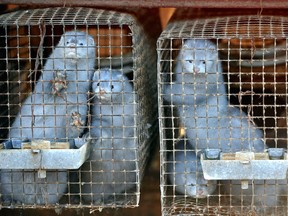Opinion: It's time for Canada to ban fur farming
To allow factory fur farming to continue in the name of fashion and profit is morally reprehensible and unbefitting a compassionate nation such as Canada.

Article content
Note: This is a corrected version of an earlier story. Correction appended below.
When a Montreal SPCA investigation publicly revealed horrible conditions on a fox and mink fur farm in the Montérégie last August, ultimately leading to animal cruelty and neglect charges against the owner of the farm two weeks ago, many Canadians were shocked. The charges came just a week after the media began reporting on new footage obtained by the Association for the Protection of Fur-Bearing Animals of several other fur farms across Canada, again showing animals in cramped wire cages, exhibiting what experts described as “clear signs of stress and suffering.”
Considering all this, it has become abundantly clear that the factory fur farming industry is a national problem, and it needs to be shut down.
The fur industry is now in the spotlight, and the footage demonstrates clearly why it is inherently inhumane to confine wild animals in wire enclosures so small and limiting that they cannot engage in important natural behaviours, such as burrowing and swimming, for their entire lives. Such conditions cause severe psychological distress for the animals, often leading to self-induced injuries that go untreated. To imprison these animals with such disregard for their intrinsic needs is in itself unacceptably inhumane.
The only escape these animals have is death. Unfortunately, the killing methods are also cruel. Fur farmers often kill their minks by gassing with carbon monoxide or neck-breaking, and typically dispatch their foxes by means of anal electrocution.
To allow factory fur farming to continue in the name of fashion and profit is morally reprehensible and unbefitting a compassionate nation such as Canada.
It’s all the more unjustifiable when considering that the industry often turns to government subsidies to stay afloat and to promote its products abroad.
Beyond being inherently cruel to the animals it exploits, fur farming is immensely damaging to the natural environment. Taking into account the tremendous amount of energy consumed, the animal refuse created and the chemicals such as tar, chromium and formaldehyde required to prevent the fur from biodegrading, farmed fur proves to be the opposite of a “green” option. In its entire life cycle, fur farms produce more greenhouse gasses, cause more water and soil pollution, ozone depletion and toxic emissions than any other textile production process.
The Canadian government should join such countries as Austria, Croatia and the United Kingdom in showing global leadership by banning fur farming. They already have the powers to do so under the Ministry of Agriculture and Agri-Food, which governs issues pertaining to agriculture and animal welfare. It is time to act.
As individual Canadians, we can do our part by calling on our government to make this much-needed change, and by choosing to avoid wearing fur.
The course of history is inevitably moving toward more compassion for animals, and more action to reduce our impacts on our natural environment. One day the fur farming industry will be shut down. It’s just a question of when.
Future generations will look back and find it hard to understand why we did not act sooner in the face of such a blatantly damaging, cruel and unnecessary industry. Let’s choose to be the generation that stood up for animals and the environment by saying no to fur farming.
Gabriel Wildgen is a campaign manager for Humane Society International/Canada
Correction: An earlier version of this story erroneously referred to cyanide being used to prevent fur from degrading.






Postmedia is committed to maintaining a lively but civil forum for discussion. Please keep comments relevant and respectful. Comments may take up to an hour to appear on the site. You will receive an email if there is a reply to your comment, an update to a thread you follow or if a user you follow comments. Visit our Community Guidelines for more information.